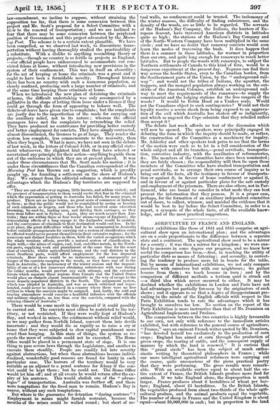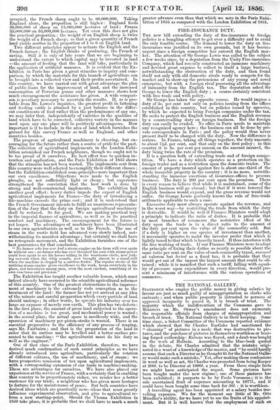AGRICULTURE IN FRANCE AND ENGLAND.
GREAT exhibitions like those of 1851 and 1855 comprise an agri- cultural show upon an international plan ; and the advantages are on a scale proportionate to the difference between a separate state and a continent. The agricultural show used to be a mirror for a county ; it was then a mirror for a kingdom ; we were ena- bled to measure in 'some degree our progress, and we know how useful the comparison has been,—first, in teaching the utility of particular diets as means of fattening ; and secondly, in correct- ing the tendency to produce mere fat in beasts for the table. But by means of international exhibitions, we not only compare ourselves with ourselves but with our neighbours ; we gather lessons from them ; we teach lessona • in turn ; and by the comparison of different methods a tertium quid is struck out —a third idea which never occurred to either. It may be doubted whether the exhibitions in London and Paris have not had advantages but partially foreseen by the originators of such shows ; and it appears to us that a degree of disappointment pre- vailing in the minds of the English officials with reaped to the Paris 'Exhibition tends to rate the advantages which it has brought to ourselves too low. No section on the report of the Paris Exhibition is more instructive than that of Mr. Dennison on Agricultural Implements and Produce. The comparison between the two countries is highly favourable to our own, not only with reference to the immediate articles exhibited, but with reference to the general course of agriculture. "France," says an eminent French writer quoted by Mr. Dennison, "has devoted herself too exclusively to the production of corn crops ; England has aimed at corn through the production of green crops, the rearing of cattle, and the consequent supply of manure by which the land is renewed." It is curious that this "grand circle" has been the subject of mush enthu- siastic writing by theoretical philosophers in France ; while our more intelligent agricultural reformers were carrying out the course, quite unconscious of the pious practical poetry that they were performing. The gross results were remark- able. With an available surface equal to about half the en- tire extent of France, the British Islands produce more food for animals. If we take England alone, the disproportion is much larger. France produces about 6 hectolitres of wheat per hec- tare; England, about 25 hectolitres. In the British Islands, the vegetables produced form about two-thirds of the whole agri- cultural produce, and the animal products equal the vegetable. The number of sheep in France and the United Kingdom is about equal—about 35,000,000 in each; but in proportion to the lath eccuyied, the French sheep ought to be 60,000,000. Taking England alone, the proportion is still higher : England feeds 30,000,000 of sheep on 15,000,000 hectares of land; France 35,000,000 on 53,000,000 hectares. Yet even this does not give the practical _proportion : the weight of an English sheep is twice the weight of a French sheep ; so that a given quantity of French land yields mutton in the proportion of 1 to 6 on English land. Two different principles appear to actuate the English and the French farmer ; the English thinks of producing, the French of saving. Still it is only of late years that we are beginning to -understand the extent to which capital may be invested in land —the amount of feeding that the land will take, particularly in the application of artificial manures. It is evident that the Er hibition in Paris has given a great stimulus to inquiry and com- parison, by which the materials for this branch of agriculture can be brought into a collected view and their profits ascertained. In this country, we have carried out with great advantage the plan of public loans for the improvement of land, and the increased consumption of Peruvian guano and other manures shows how much encouragement the assistance has given. A wide compari- son is peeuliary necessary to ascertain the results. If, as is pro- bable from Mr. Lewes's inquiries, the greatest profit in fattening and feeding cattle is attained by a just balance in the differ- ent constituents of food rather than the predominance of any one, we may infer that, independently of varieties in the qualities of land which have to be corrected, collective variety in the manure used upon any one place will be positively advantageous. How important is it to include in the area of land which furnishes the ground for this survey France as well as England, and other countries besides.
• The progress of agricultural machinery is cheering, but en- conraguig for the future rather than a source of pride for the past. The collection of agricultural implements in the London -Rxhi- bition astonished our French neighbours' though we ought not to be too proud of it ourselves. Its best effect was to quicken in- vention and application, and the Paris Exhibition of 1855 shows that the stimulus has not been wasted. The implements sent from this country werewell selected to exemplify their different classes ; but the IA liition established some principles more important than our own excellence. Objections were made to the English ploughs, as not sufficiently light or cheap ; but experience strengthened. the conviction that the best work is done by strong and well-constructed implements. The exhibition had another good effect: heavy duties impede the export of English agricultural implements for France—the duty of introducing a idle-machine exceeds the prime cost ; and it is understood that the French Government intends to fulfil an unanimous representa- tion of the Jury that the duty on foreign agricultural machinery atoll be reduced. So far good. We are making practical way in the imperial finance of agriculture, as well as in its practical conduct and machinery. The encouragement for the future is yet larger. The advantages of machinery have been illustrated to our own agriculturists as well as to the French. The use of steam in the rustic field has advanced very slowly indeed, not- withstanding its manifest advantage ; but certainly we shall have no retrograde movement, and the Exhibition furnishes one of the best guarantees for that conclusion. "No farmer who hoe ever had a steam-engine on his farm will ever again be without one ; no farmer who has ever thrashed his corn with steam-power could bear again to see his horses toiling in the wearisome circle, now jerk- ing onwards when the whip sounds, now brought almost to a stand-still when the machine is clogged by a careless feeder. The regular stroke of the untiring steam-engine gives excellence to the work, keeps everybody in his place, and introduces among men, even the most careless, something of its own exactness and precision."
The Exhibition has taught another valuable lesson which must indeed already have occurred to the scientific agricultural reformer of this country. One of the greatest obstructions to the improve- ment of machinery is the extremely rude conception as to the treatment of the land: the farmer has not yet arrived at any idea of the minute and careful preparation which evearticle of land should undergo ; in other words, he spreads his industry over too large an expanse of merely raw earth. This plan has two defects : in the first place, the amount of gross land subjected to the opera- tion of a machine is too great, and mechanical power is wasted ; in the second place, the actual spew is needlessly wide and the operation of machinery per piston-stroke is wasted. There is an mental preparative to the efficiency of any process of reaping, says Mr. Fairbairn ; and that is the preparation of the land in order that its surface may be levelled and a better surface pre- sented. to the machine : "the agriculturist must do his duty as well as the engineer."
Out of that class of the Paris Exhibition, therefore, we have derived much confirmation of such sound principles as we have already introduced into agriculture, particularly the rotation of different cultures, the use of machinery, and of steam; we have prospective remission of tax upon agricultural implements, with a corresponding extension of our trade in machine-making. These are advantages for ourselves. We have also placed our experience at the service of France, with a certainty that in enabling that country to be proportionately richer, we render her a better eustomer for our trade, a neighbour who has given more hostages to fortune for the maintenance of peace. But both countries have derived ideas which are practically new—ideas that must greatly influence experimental observation and give to agricultural re- form a new starting-point. Should the Vienna Exhibition in 1859 take place, it is probable that we shall have to mark a much greater advance even than that which we note in the Paris Exhi- bition of 1855 as compared with the London Exhibition of 1851.



























 Previous page
Previous page